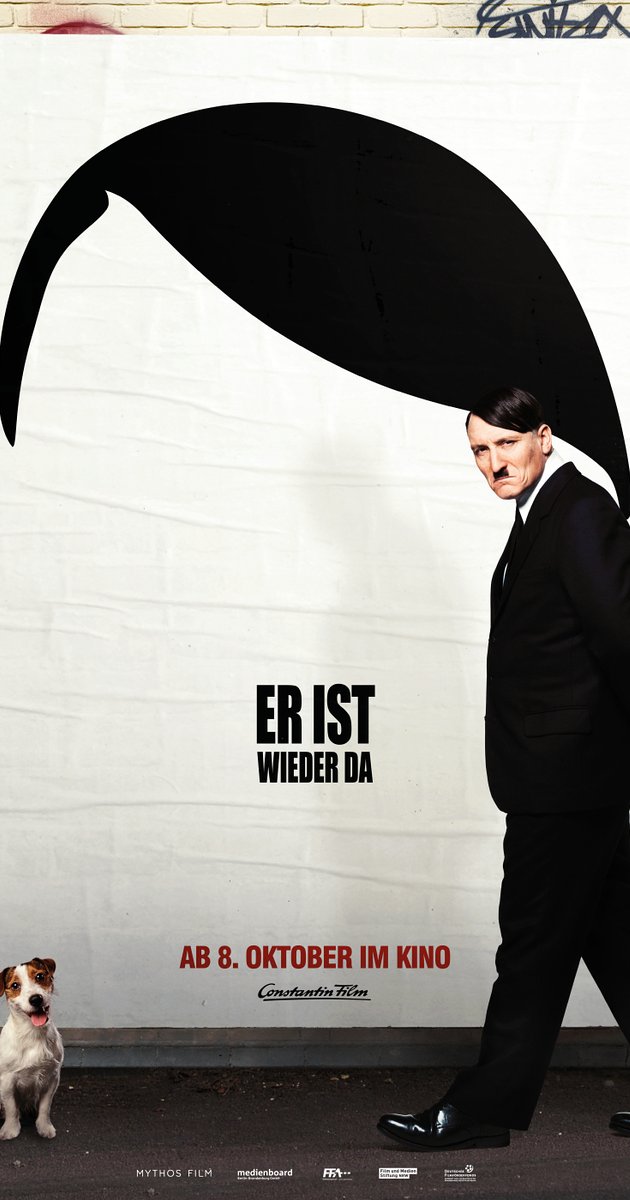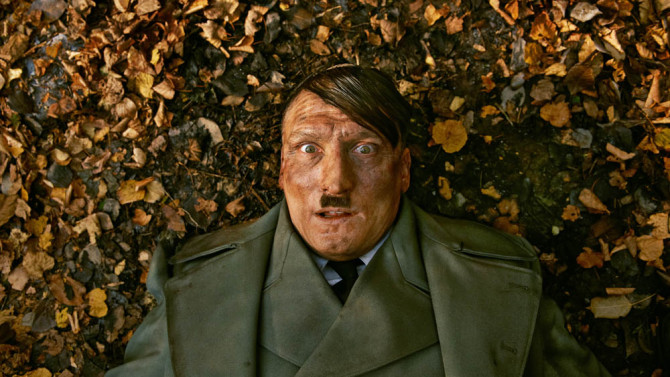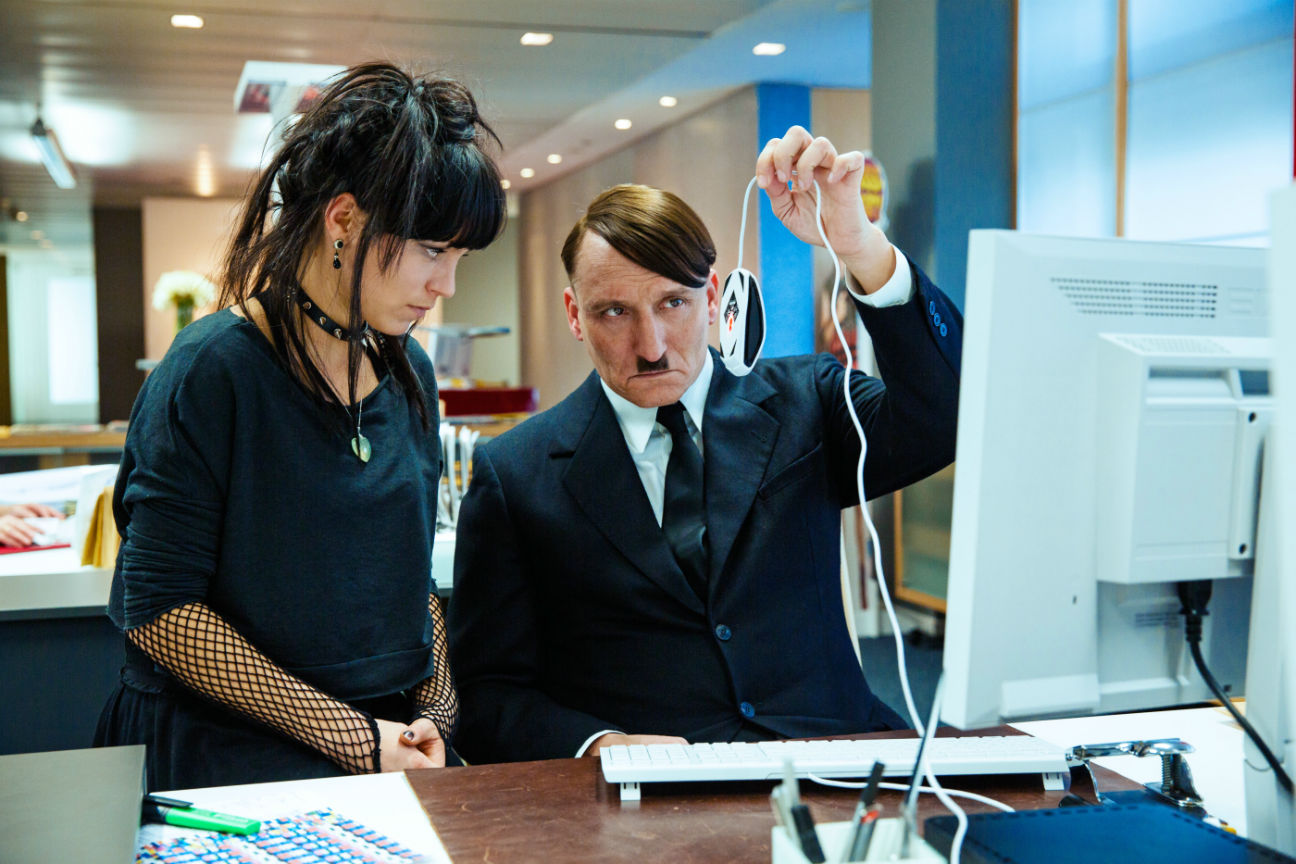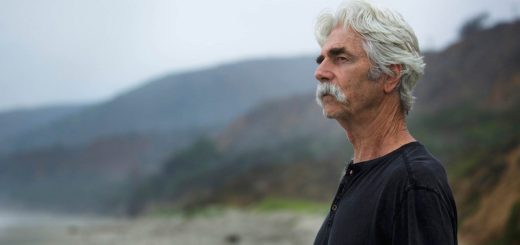LOOK WHO’S BACK Review

Director: David Wnendt
Genre: Comedy
Year: 2015
Netflix’s latest acquisition aimed primarily at the German market couldn’t be any more bold. LOOK WHO’S BACK, a cinematic adaptation of the best-selling novel of the same name, follows Hitler’s sudden arrival in the year 2015 and his rise to fame as a method comedian. Conceptually, director David Wnendt could be playing with dozens of lowest common denominator gags in order to get a kick out of his viewers, but perhaps the most astounding discovery is that LOOK WHO’S BACK is not only a good comedy, but one that plays out as tasteful and relevant for the German target audience.
Taking off like a blitzkrieg on your television screen, LOOK WHO’S BACK does not muck around, willfully avoiding any explanation for Hitler’s time travelling. Shot in a bright, saturated aesthetic, LOOK WHO’S BACK is quintessentially German filmmaking, and oft feels a tad bit unprofessional as a result, and yet its amateur visual execution often plays in its favor, coming across as endearing rather than cheap. Embracing the novel’s absurdity, Wnendt realizes that the best approach to making this film play is by toying with a nudge-and-wink “just go with it” mentality. As such, it’s never a question of why lead actor Oliver Massucci isn’t being given his Nuremberg trial, because cleverly incorporated documentary vignettes help highlight just how little the German people really care about a Hitler impersonator in the 21st century.

Tfw you smell Döner Kebab for the first time…
With this technique, Wnendt makes a compelling case against a growing sense of nationalism across the board in Europe, camouflaging his absurdist comedy as some pseudo-Borat romp. It’s never quite as thought-provoking or satirical, but it’s absolutely riotous for anyone familiar with the current state of German politics. Foreigners will certainly get a kick out of Hitler’s antics and much of the situational humor, but LOOKS WHO’S BACK’s greatest accomplishment is that it’s also a strong political commentary, going as far as even addressing just how embedded Hitler’s legacy is in the German people, and that his dictatorship is something that should never be forgotten, but rather studied, accepted, and quietly dishonored.
Much of this accomplished through Oliver Massucci’s portrait of the dictator, a performance that hinges entirely on being sympathetic despite having all odds stacked against him. His archaic German clashes wonderfully with the modern slang of the Berlin people, and he shines during the film’s brief documentary portions. Wnendt cleverly capitalizes on treating Massucci like an abused homeless man in his opening, scoring just about all necessary brownie points to transform the orchestrator of the Holocaust into a lost house cat. From there on out, the film snowballs into a comedic political commentary. It’s never quite satirical enough to land some hard punches on German politics, but it does an impeccable job at showing just how far the nation has made it since the end of the war, and how easily it can domino back into nationalist leadership.

“This is the transit device to the Porn Hub?”
I remember when LOOK WHO’S BACK was displayed in every major bookstore in my home country of Romania and I made the mistake to write it off as crass humor put onto paper, but with a film adaptation I figured it was about time to give the story a chance. After all, somebody somewhere thought this was somehow going to work. With all that it does right, it’s a shame that it didn’t go the extra mile to be more harrowing in its profundity. Though it tries to turn the tables on the viewer in its finale, it feels like it is just shy of really making viewers come to terms that Hitler will never be a laughing matter, as much as we might want to try. The Normandy invasion of the year, LOOK WHO’S BACK somehow managed to be a captivating, clever comedy despite being just about the most ludicrous investment I’ve come across in recent memory.
Verdict: Recommend



